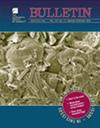缅甸中部蛇绿岩带Indawgyi基性岩的内-新特提斯俯冲起始
IF 3.9
1区 地球科学
Q1 GEOSCIENCES, MULTIDISCIPLINARY
引用次数: 0
摘要
地质证据表明,在白垩纪期间,新特提斯内部存在俯冲系统。然而,这种洋内俯冲是何时以及如何开始的,特别是新特提斯东部的俯冲,仍然没有得到很好的限制。本文对西缅甸地块中央蛇绿岩带的Indawgyi基性岩进行了地球化学和年代学分析,这些岩石记录了新特提斯内-新特提斯俯冲起始期的早期弧前扩张。辉长岩锆石U-Pb年龄表明蛇绿壳形成时间约为120 Ma。辉长岩呈现类似中洋脊玄武岩的稀土元素模式,Sr-Nd-Pb同位素组成贫化,高场强元素(Nb、Ta、Zr、Hf)负异常,与弧前玄武岩特征相似。玄武岩比辉长岩表现出更多的板源成分特征,代表了极可能形成于弧前扩张和弧成熟之间的地幔楔岩浆。结合区域地质记录和地球物理观测资料,认为印道盖辉长岩形成于俯冲起始早期的新特提斯弧内。结合印缅山脉上俯冲带蛇绿岩和变质底岩的形成时间,认为新特提斯岩石圈东部早白垩世(约120 Ma)的自发俯冲起始和下沉导致印多吉弧前地壳的形成,而随后的成熟俯冲作用导致西缅地块中白垩世(约108-90 Ma)弧岩浆活动。这些发现证实了新特提斯洋的双俯冲模式,并对新特提斯洋内-新特提斯洋的俯冲起始有了新的认识。本文章由计算机程序翻译,如有差异,请以英文原文为准。
Intra−Neo-Tethyan subduction initiation inferred from the Indawgyi mafic rocks in the Central Ophiolite Belt, Myanmar
Geological evidence has demonstrated the presence of an intra−Neo-Tethyan subduction system during the Cretaceous. However, when and how this intra-oceanic subduction was initiated, especially for the eastern Neo-Tethys, are still not well constrained. Here we present geochemical and geochronological analyses of the Indawgyi mafic rocks from the Central Ophiolite Belt in the West Burma Block (Myanmar), which record early forearc spreading during the intra−Neo-Tethyan subduction initiation. Zircon U-Pb ages of gabbros indicate the ophiolitic crust formation at ca. 120 Ma. Gabbros show mid-oceanic-ridge basalt−like rare earth element patterns and depleted Sr-Nd-Pb isotopic compositions with negative anomalies of high field strength elements (e.g., Nb, Ta, Zr, and Hf), similar to forearc basalt characteristics. Basalts show more slab-derived component signatures than the gabbros and represent mantle wedge magmas most likely formed between forearc spreading and arc maturation. These data, together with regional geological records and geophysical observations, suggest that the Indawgyi gabbros were derived from an intra−Neo-Tethyan forearc setting during the early stage of subduction initiation. Considering the timing of supra-subduction zone ophiolites and metamorphic sole in the Indo-Burma Range, we propose that spontaneous subduction initiation and sinking of the eastern Neo-Tethyan lithosphere during the Early Cretaceous (ca. 120 Ma) led to formation of the Indawgyi forearc crust, whereas subsequent mature subduction resulted in the Middle Cretaceous (ca. 108‒90 Ma) arc magmatism in the West Burma Block. These findings confirm the double-subduction model of the Neo-Tethys Ocean and shed new light on the intra−Neo-Tethyan subduction initiation.
求助全文
通过发布文献求助,成功后即可免费获取论文全文。
去求助
来源期刊

Geological Society of America Bulletin
地学-地球科学综合
CiteScore
9.30
自引率
8.20%
发文量
159
审稿时长
4-8 weeks
期刊介绍:
The GSA Bulletin is the Society''s premier scholarly journal, published continuously since 1890. Its first editor was William John (WJ) McGee, who was responsible for establishing much of its original style and format. Fully refereed, each bimonthly issue includes 16-20 papers focusing on the most definitive, timely, and classic-style research in all earth-science disciplines. The Bulletin welcomes most contributions that are data-rich, mature studies of broad interest (i.e., of interest to more than one sub-discipline of earth science) and of lasting, archival quality. These include (but are not limited to) studies related to tectonics, structural geology, geochemistry, geophysics, hydrogeology, marine geology, paleoclimatology, planetary geology, quaternary geology/geomorphology, sedimentary geology, stratigraphy, and volcanology. The journal is committed to further developing both the scope of its content and its international profile so that it publishes the most current earth science research that will be of wide interest to geoscientists.
 求助内容:
求助内容: 应助结果提醒方式:
应助结果提醒方式:


